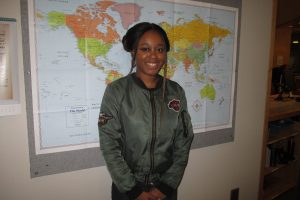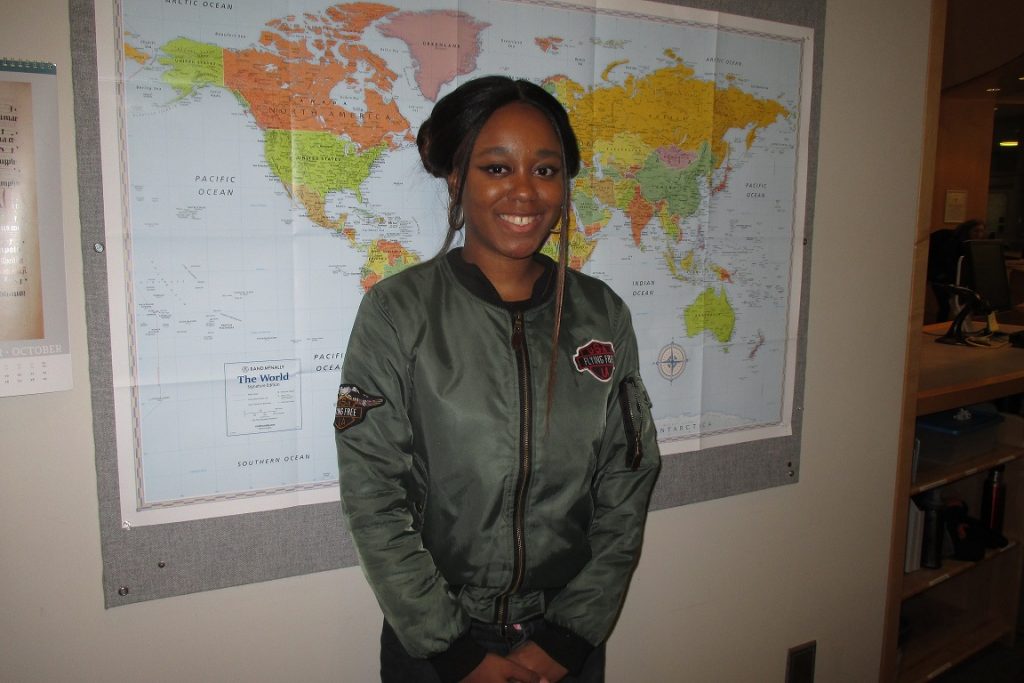 In each issue of Keywords, we profile one of the many student assistants who help make the Middlebury Libraries run smoothly. This issue features Jasmine Crane, who works at the Circulation Desk at Davis Family Library.
In each issue of Keywords, we profile one of the many student assistants who help make the Middlebury Libraries run smoothly. This issue features Jasmine Crane, who works at the Circulation Desk at Davis Family Library.
Jasmine Crane comes from Jacksonville, Arkansas. Her calm and confident demeanor is an quality her supervisors appreciate, especially when the desk pace is hectic. An enthusiastic and vibrant student of science, Jasmine is majoring in Molecular Biology and Biochemistry. We admire her passion for the sciences and we wanted to find out more about how her seeds of dedication to the field originated.
How did you initially become drawn towards the science field? Was your interest in science ignited by a specific teacher or class?
I was good at math in elementary school, and my mother took notice. She asked if I might be interested in science, and in the 8th grade I became fascinated with meiosis (cell reproduction in bacteria) and mitosis (cell division in somatic cells.) My junior year of high school, I took general chemistry and the following year I was in AP chemistry classes.
As a young student from Arkansas, how did you narrow down your college career choice to Middlebury College?
I applied to several schools in Arkansas because that was my preference, staying within state. I wanted to attend a small liberal arts school called Hendrix College near my home. I ended up graduating from high school in the top 1% of my class, with a 4.1 GPA, but Hendrix was expensive. There were many others as well, but it turned out that Middlebury was a better financial choice for me.
Did your interest in science cause you to stand out among your classmates, particularly your female peers?
Most of my friends are in the arts or social sciences. They are supportive and encouraging towards me, and they enjoy having a friend who is a “science enthusiast (nerd)” like me. We have a lot of fun and they tease me about it sometimes, but I know they think it is pretty cool.
From your experiences growing up in a small southern town, can you talk about how your childhood may have influenced your science goals?
I was fortunate enough to become a member of the Arkansas Commitment Scholarship, a nonprofit organization created to identify academically talented African-American high school students throughout central Arkansas and guide them to become leaders of society at large, as well as within the African-American community in Arkansas. That organization had a big impact on my science goals. I later met William Fantegrossi, Ph.D., associate professor at the University of Arkansas, Pharmacology and Toxicology Department. He researches synthetic cannabinoids (constituents of K2/”Spice” smoking blends), analogues of cathinone (present in “bath salts” preparations), and novel arylcyclohexylamines (related to PCP and ketamine). I have learned a great deal from working with Professor Fantegrossi, and from my experience in the lab, I am now contemplating my future career in lab research for immunology and microbiology, or becoming a doctor of medicine. I am drawn to medicine because I want to be a doctor with excellent bedside manner skills, treating patients with dignity, rather than as a number or a medical term on a chart. Many patients see their nurses more often than doctors, and I would like to be a part of that change.
I understand that your mother was – and continues to be – a powerful influence in your life. Can you talk about how she has affected your important decisions as a young adult?
My mother is my best friend and she is my key role model. I was born in London since my mom was in the U.S. Air Force at the time. My parents and I lived there until I was three, when a transfer to Alaska came up. We lived in Anchorage for a year, then we moved back to Arkansas because my father’s mother was ill, and my parents wanted to be near her. When I turned 13, my mother retired from the Air Force because she wanted to create a stable home life for me and avoid moving around every two or three years.
As an senior, having acquired all of the experiences from your education at Midd, you seem ready to tackle your career, even though your exact place of employment is not yet in place. Is that an accurate assessment?
Yes. Middlebury has prepared me for my medical future, and other institutions, individuals and personal factors have influenced me as well. I feel fortunate because last year I won the national poster presentation award at the Annual Biomedical Research Conference for Minority Students (ABRCMS). It is one of the largest communities of underrepresented minorities in science, technology, engineering and mathematics. It was an amazing honor.
From your perspective as a female, African-American science scholar, what are your thoughts about the recent campus events on the topics of race and respect for everyone?
I feel that students drive their own communities, and the black student population is disbursed throughout the school, so we don’t have a center. There is a need for mental health counseling, and it is difficult because there are no black counselors for us to relate to. It can be frustrating to be without good representation on campus. The conversations need to continue and having more African-American faculty members, professional counselors, and staff leaders would benefit the entire college community. They only thing we can do now is take everything one step at a time as a community and improve the social climate for students of color.
Thank you Jasmine! We know that you have an exciting future in the sciences!
